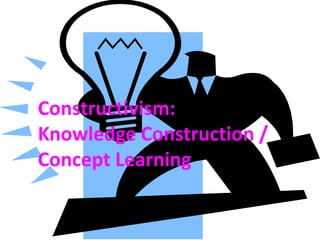
Constructivism: Knowledge Construction / Concept Learning
- 1. Constructivism: Knowledge Construction / Concept Learning
- 2. “ Teaching is not about filling up the pail, it is about lighting a fire” Constructivism: focuses on knowledge construction .It is a theory of knowledge that argues that humans generate knowledge and meaning from an interaction between their experiences and their ideas
- 3. 2 views of constructivism • Individual constructivism • Social constructivism
- 4. • Individual constructivism: also called cognitive constructivism. emphasizes individual, internal construction of knowledge
- 5. • Social constructivism: knowledge exist in a social context and is initially shared with others instead of being represented solely in the mind of an individual
- 6. Characteristics of constructivism 1. Learners construct understanding 2. New learning depends on current understanding 3. Learning is facilitated by social interaction 4. Meaningful learning occurs within authentic learning tasks.
- 7. Organizing knowledge Concepts: a concept is a way of grouping or categorizing objects or events in our mind. • Concepts as feature lists –learning a concept involves learning specific features that characterize positive instance of the concept a. Defining feature- characteristic present in ALL instances b. correlational feature-present in many positive instances but not essential for concept membership
- 8. • Concepts as prototypes – prototype is an idea or visual image of a “typical example. It is usually formed based on the positive instances that learners encounter most often. • Concepts as exemplars – exemplars represent a variety of examples. It allows learners to know that an example under a concept may have variability
- 9. • Making concept-learning effective a) Provide a clear definition of the concept b) Make the defining features very concrete and prominent c) Give a variety of positive instances d) Give negative instances e) Cite a “best example” or a prototype f) Provide opportunity for learners to identify positive and negative instances g) Ask learners to think of their own example of the concept h) Point out how concepts can be related to each other
- 10. • Schemas and scripts -schema is an organized body of knowledge about something -script is a schema that includes a series of predictable events about a specific activity.
- 11. Applying constructivism in facilitating learning • Aim to make learners understand a few key ideas in an in-depth manner, rather than taking up so many topics superficially. • Give varied examples • Provide opportunities for experimentation • Provide lots of opportunities for quality interaction • Have lots of hands-on activities • Relate your topic to real life situations • Do not depend on the explanation method all the time.